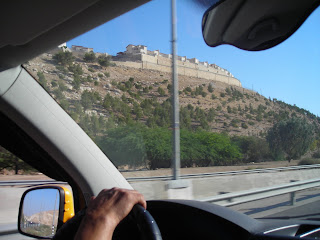


The road north back from Nablus towards Ramallah and Jerusalem passes through barren landscape, bare rocky hills with some occasional olive trees, terraces hundreds of years old maybe. Everywhere there are scatterings of Israeli settlements. Maale Adonim is the main one near Abu Dis but there are others. The settlements usually occupy strategic settlements on top of hills. Once they are in place, they have special access roads. The existing Palestinian villages and towns then 'become the problem' for the settlements. New security checkpoints are put down, Palestinians have to drive around the settlements, they 'become a potential danger to the settlers'. Khaled tells me that the settlers have all kinds of inducements from the Israeli government to come and live here: lower taxes, free water, subsidised transport. I look up at the settlements crowning some of the hills - fortress like structures with neat modern houses. I imagine that life must be sterile and isolated there. Khaled says no, they have nice gardens. Who do the settlers socialise with I ask. He says they can drive to Jerusalem quite quickly. They don't mix with Palestinians apart from workers who are sometimes employed to work there, or store-owners in some transitional border towns like Al-Eizaria.
The taxi goes past the huge checkpoint outside Ramallah. This time because we are not heading for Jerusalem but going directly to Abu Dis, we are not stopped.
A few nights ago, I go and get my hair-cut in Abu Dis. While I am waiting, I get into conversation with a young student. He is 15 but looks older. He has spent some time in Chicago staying with relations. Like many Palestinians he has large numbers of family members living abroad, and he dreams of living somewhere else too. He speaks English well with the beginnings of an American accent. He tells me about things that have happened to him and his friends in Abu Dis. 'I live near the building where the soldiers' building is. One day when I was 13, they started hammering on the door of my house. They accused me and my friend of deliberately leaving a dead dog outside their barracks. I knew nothing about it. But they forced us to pick up the dog which was rotten and crawling with worms ......'. He pointed to a shop across the road from the barbers. 'My friend was walking past that shop late at night and he was stopped by soldiers. Forced to lie face forward against the shop front with his arms and legs spread out. While he was doing that, one of the soldiers ran up behind him and gave him a kick between the legs. They often do that. One of them kicks a teenager between the legs and the other soldiers just stand round and laugh. To them it's a game'.
I get talking to Abid, who is employed by CADFA (The Camden Abu Dis Friendship Association) to document human rights issues here. He writes reports which are then published in the UK and Europe, and highlight what is going on. The effect is invaluable because it shines an international spotlight on what is going on. The Israeli 'authorities' know that what they do is not going to remain invisible to the international community. As a result conditions here are probably better than in some other parts of the Palestinian territories. Abid says that it is amazing that 70,000 can live some kind of normal life under these conditions of occupation. He tells me about some cases he is investigating. In one incident two years ago, some soldiers broke into a class of a secondary school (the same school where our summer camp had our sports day last week) and started beating up the students. In another, a young man from Abu Dis on a trip to the Dead Sea, was stopped by two soldiers and asked for drugs. When he said he didn't have any, he was forced to drive into a settlement past the barriers, and then was attacked by the soldiers for illegal trespass. He was chained to a post and beaten. One of the settlers joined in. In this case, Abid was able to investigate, expose the lies of the soldiers who have now been given a prison sentence.
Abid works with some Israeli human rights organisations like B'Tselem, and it is possible sometimes with difficulty to get some kind of just outcome through the Israeli courts. That becomes more likely if there is the possibility of international attention. That is why the twinning movement (Abu Dis is twinned with Camden, Tower Hamlets is twinned with Jenin etc.) is so important. Abid says that in the past he had Israeli friends. 'We used to visit each others' houses, give each other advice. It started to change with the Israeli invasion of Lebanon in the 1980's. Now with the wall there is very little contact'.
No comments:
Post a Comment